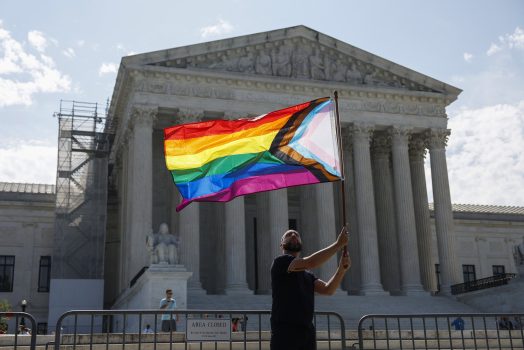
Editor’s Note: For the next two weeks, “The Wall of Separation” blog will recount the top 10 church-state stories from 2023. Today we recap the year’s Supreme Court decisions that impacted religious freedom.
The U.S. Supreme Court may not have delivered the repeated devastating blows to church-state separation in the past year that the court’s ultra-conservative justices landed the previous term, but those justices still did damage to freedom and equality in 2023.
Among the court’s most harmful rulings this year was the 303 Creative v. Elenis decision. The 6-3 conservative majority ruled that a Colorado website design company was involved in “expressive” conduct and that requiring the business to serve those who didn’t live according to the owner’s religious tenets – namely, LGBTQ+ people – would amount to “compelled” speech.
Americans United denounced the opinion and warned that it would open the door to more discrimination. “Today, [the court] allows religiously motivated discrimination against our LGBTQ family and friends; tomorrow, the license to discriminate could extend to other vulnerable communities too.”
AU President and CEO Rachel Laser appeared on MSNBC’s “Deadline: White House with Nicolle Wallace” to explain the ruling’s magnitude. The decision “is dragging us backwards,” Laser warned. “A year ago when this court abolished the nationwide right to an abortion, we at Americans United said they’re coming for all other marginalized communities next, and that includes LGBTQ people. And here we are today, heartbreakingly on the last day of Pride, and the court, historically in a terrible way, has said for the first time ever, businesses that are open to the public have a constitutional right to discriminate, have a constitutional right to refuse to serve protected classes.”
The rest of the Supreme Court’s actions involving church-state separation this year weren’t nearly as harmful as the 303 Creative decision.
So far this term, church-state separation advocates are getting a small reprieve from the Supreme Court. But AU is prepared to respond when new cases that impact religious freedom inevitably land on the court’s docket.
“With no religion cases on the court’s docket so far for the upcoming term, we welcome a reprieve from these attacks,” Laser told UPI in October. “But we’re monitoring cases that could be granted in the future, including those that urge the court to weaponize religious freedom and further limit reproductive freedom, curtail LGBTQ+ rights and harm public health.”